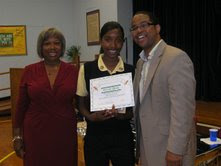Here are the next set of thought /discussion questions for the book club. Remember to feel free to tune in, as well as to leave a comment on the blog.
The chapter begins with the part of Dr. Martin Luther King’s speech, I have a Dream.
1. Do you consider yourself a Cultural Relevant teacher? Why or why not?
2. Why do you think Dr. Ladson-Billings began this chapter with a vignette? Do you have any experiences to share like this?
3. AT the end of the vignette on page 31, last sentence..What are you doing to make your students feel, special, important & smart?
4. Do you feel that we acknowledge the racial & ethnic differences of the students whom we teach? Why is this so important?
5. On page 32, Billings, speaks about an early study that was conducted on pre-service teachers, paragraph 2. Read paragraph 2 and think of our school and its culture to answer the 3 important questions.
6. Page 32 – If a teacher looks at a classroom and sees the sons and daughters of slaves, how does that vision translate into her expectations for educational excellence. When we look at our children and see the faces of those who have socio-economic and educational problems, do we lower our expectations for these children?
7. What happens when teachers don’t see racial or ethnic differences in their classrooms?
8. Let’s compare the culture relevant Teacher to the Assimilations teacher.
9. Do you feel Joe Public, looks at our public school system as catering to the lower white income families PLUS blacks & the private schools are for the WHITES and upper class blacks. Do you feel this is true?
10. Page 35 Ms. Dupree states that when one of her students asked, “why you so dressed up?” she replied that she dresses that way because she was coming to work & works with very important people, so she wanted to look good. Do feel professional attire speaks volume for the teacher & their profession?
11. Page 35 describes Pauline Dupree what she looks like, how she dresses & what her classroom looks like & how it is run. The conclusion made was that the students were well behaved and orderly. What does this speak to in reference to the role model teachers are to their students?
12. What persona is given off by those teachers who dress poorly? Should professional dress be revisited here in Bda?
13. If you look good, you feel good, you want to be the BEST!!
14. Read pages 36 & 37, Dupree is talking with her students about wanting to become a teacher. Do you have these conversations with your students? Explain
15. Hwy is it important to see yourself as part of your school’s community? Explain the phrase, teaching is giving back to the community. Do you encourage your students to do the same?
16. Do you fit the mold of Dupree ”neat & orderly”, or Deveraux ”organized chaos”?
17. Deveraux had a missing child so she activated her –telephone tree, do you agree with having something like this as a teacher?
18. Parental involvement – What do WE do to get parents involved?
19. What are the characteristics that an excellent teacher should have that would inspire young scholars to want to become a teacher?
20. How important is it to spend time outside of the classroom to build community spirit? What would that looks like?
21. Do you see teaching as an ACT, Science or ART. Explain.
22. Do you see yourself in your students? Do they have your experiences, background, stories?
23. Peggy Valentine is on of the best teachers at the school she teaches. Her principal doesn’t like her personally, BUT he does acknowledges her as one of his best. Do you feel our leaders can separate the personal from the professional?
24. Do you believe that ALL students can achieve? Support your answer. – refer to CH2 page23 to assist you Why is it important to have a classroom that shouts success & a loving environment? What does this look like?
25. Does the competence of your Principal dictate the success in your classroom & in your school? Why or why not?
26. Is it important that students say positive affirmations to begin & end their day?
27. What are some practices we can take as educators from our colleagues in Chapter 3?
28. Why is it important to help students make connections between their community, island and the world?
29. One of her subjects – Margaret Rossi, states that she hated working at the private schools because she felt students were given material things BUT lacked sincere parental involvement, parents did what they were told they had to-do and nothing extra. Relate this to both our private & public schools.
30. Bermudian students are known for their talkativeness, who will be their selves no matter what and who will tell you exactly how they feel. Do you feel this is a strength, If so how can teachers best utilize this strength?
31. How does teaching with culturally relevant practices “dig knowledge out” of students?








































